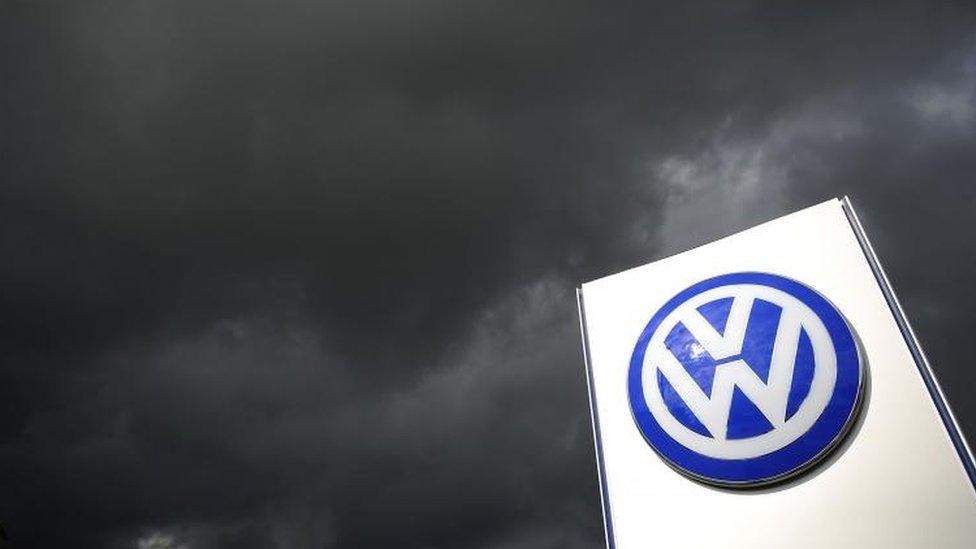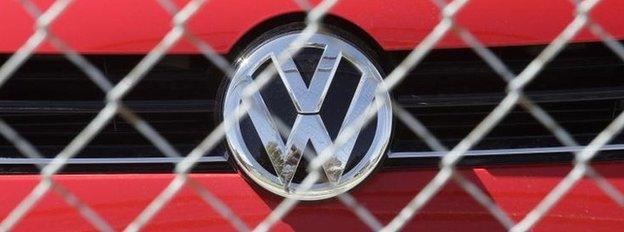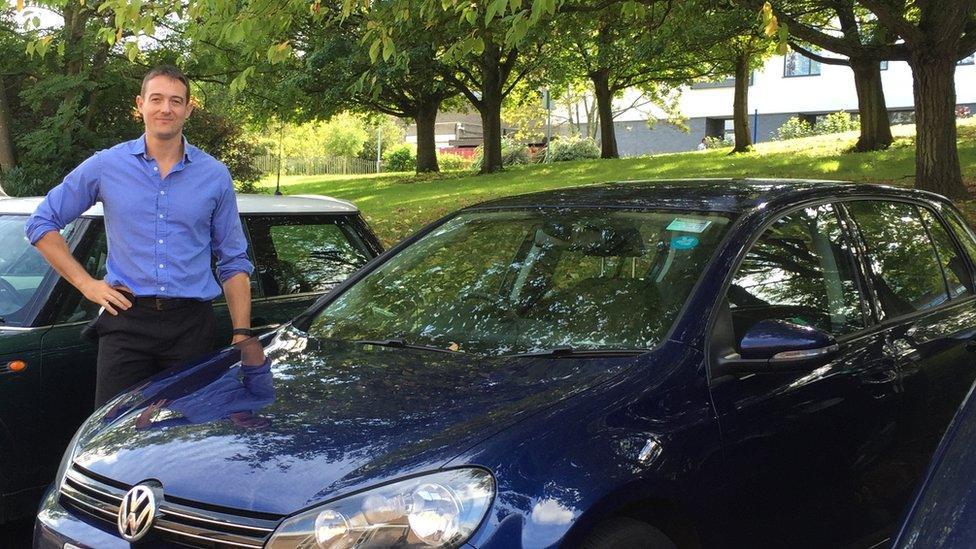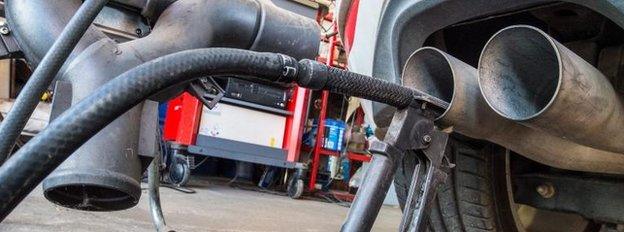Help! I'm a VW car owner, what should I do?
- Published

Drivers of Volkswagen cars - watching the emissions scandal engulfing the company - will naturally want to know whether they have bought a car with the performance they expect.
Add to that worries about the original cost of the car, and its value should they come to resell it, and the effect of this scandal becomes clearer in terms of pounds and pence.
And yet, absolute financial clarity remains a distant prospect.
Experts are divided as to whether the price of second-hand VWs will be affected. Despite lawyers circling, there are not enough details to conclude whether drivers will, or won't, have a claim for compensation.

What do we know so far?

The German car giant - which has lost its crown as the biggest global carmaker in terms of sales since the scandal broke - has admitted using software in the US to provide false emission results for nitrogen oxide and dioxide (NOx) tests. The firm's US boss said it "totally screwed up". Some 500,000 vehicles in the US have been affected.
This is a fraction of the 11 million VW Group cars - including Audi, Seat, Skoda and VW Commercial vehicles - around the world that have the same equipment.
The company has been outlining the breakdown of this total around the world. For example, 1.2 million of its vehicles sold in the UK are fitted with the software involved.
Until this week, the scandal only involved diesel cars, but the latest revelations about "irregularities" in carbon dioxide emissions could also affect petrol engine cars.
VW has said the problem lies in the way certain car types with "smaller engines" were certified to meet CO2 emissions standards.

What do UK drivers say?

Robin Cole with his VW
Robin Cole, a medical physicist from Surrey, says low emissions were a key factor behind his decision to buy a diesel VW Golf BlueMotion.
The 33-year-old is worried that the performance statistics were too good to be true.
"I am confident that VW will do the right thing when it comes to compensating consumers if it turns out they were misleading us into paying a premium," he says.
"They will want to keep us as faithful customers."
Oliver Ealey, a VW Golf owner from Oxfordshire, wants more information from the company.
"I want to know as soon as possible if my car has been affected and, if so, what are the actions from this point on," he says.

Will Mr Ealey get his wish?
VW has been outlining which brands and models are affected and the next steps to be taken by the company and drivers.
It will cover any costs involved, having already set aside €6.7bn (£4.8bn). And this was before the CO2 revelations - the carmaker has yet to advise customers what it plans to do to address this particular problem.
For UK customers owning cars with a so-called defeat device for NOx tests, the company is giving the vehicle identification numbers (VIN) to retailers and is contacting affected owners directly.
Those affected will be drivers who own VW diesel cars and vans registered between 2009 and 2015, but not the very latest Euro 6 models.
In the meantime, owners can check if their vehicle is affected by entering the VIN details found in their log book or on the windscreen into online checkers, external on the relevant brand's website.
The 11 million vehicles will have to go through a service procedure during 2016 or 2017 to rectify software that caused the scandal. VW says this is not technically a recall, which would have meant there could be safety or security implications.
The company says this procedure will be relatively quick, so cars will not be going into garages for days, but hire cars will be offered to those who need them.
There is no suggestion that the cars are in any way unsafe to drive, so owners can carry on driving as normal.
That is particularly important in the UK, where diesel cars account for 50% of sales. About 16% of cars on UK roads are VW Group cars.
Volkswagen scandal
11 million
Vehicles affected worldwide
-
€6.5bn Set aside by VW
-
$18bn Potential fines
-
No. 1 Global carmaker in sales

Will this scandal affect the resale price of the car?
That is very much a matter of debate.
Jim Holder, editorial director at Haymarket Automotive, which publishes WhatCar and AutoCar, told the BBC: "In the short-term, there will be an impact on the value of these cars and their desirability."
The longer-term picture might be better news for owners.
Dylan Setterfield, senior editor at CAP Black Book - a manual referred to by professional used-car dealers, says: "We do not expect there to be any significant impact on used values in the UK as a direct result of the US emissions scandal.
"The last global recall was the Toyota/Lexus issue, and despite the fact that this had serious safety implications, there was no discernible impact on used values."
He says there are reasons - other than emissions - that make diesel cars popular such as the pulling power of these engines.
"The overriding view is that diesel vehicles are more economical than their petrol equivalents - even if this is not always the case - and the torque characteristics of diesel engines are generally popular with drivers," he says.

Is compensation a possibility?
Again, it really is too early to say, but lawyers in the UK believe there is a chance.
"If UK cars are found to contain defeat devices, this would give rise to a claim by car owners and car dealerships who bought VW vehicles on the basis of false information and whose asset has now devalued," says Jacqueline Young, head of group litigation at law firm Slater and Gordon.
Lawyers in the US are already considering bringing cases.

Will my vehicle tax be affected?

The UK government has announced a testing programme on a range of diesel cars to check whether the emissions dupe is more widespread.
This could develop into a test for other types of emissions, rather than just the NOx readings which were covered up in the US.
Emissions quoted by the manufacturer are key to the level of tax levied on these vehicles when bought and thereafter. They are also key to the tax paid by employers and employees who have diesel vehicles as company cars.
Chas Roy-Chowdhury, of the ACCA accountancy body, says similar tax rules apply across Europe.
Should it be proved that tax has been underpaid owing to emissions readings being cheated, then governments may seek to recoup that money from the car company involved.
If the car company can prove that its in-lab testing met the European regulator's requirements, then such a move would be difficult to win legally.
The government has said it will ensure no drivers will end up paying higher tax costs as a result of this scandal.
Drivers may see changes to the levels of tax levied in the future, although the rules are set to change anyway.

Will my VW pass the UK's MOT emissions test?
It won't fail as a result of nitrogen oxide emissions.
The UK Department of Transport's (DoT) MOT emissions test for diesel cars measures the density of the particulates in the exhaust fumes, not the nature of the gasses produced.
A DoT spokesperson said: "This is a smoke opacity test. It is not comparable to the laboratory or road emissions tests."
The test is carried out using a calibrated smoke meter which measures the soot content in the exhaust.
VW has also stressed that vehicles will not fail MOTs owing to the cheating software.

Will this happen again?
There are plenty of questions as to whether this scandal will expose further emission testing failures and, in turn, whether this affects prices.
The RAC Foundation says that new diesels are performing as they are expected to.
More robust testing of car emissions across Europe is likely to be brought in sooner to bolster confidence. These proposed tests reveal emissions of pollutants in real driving conditions, rather than in the lab, and had been expected to start in 2017.
How VW rebounds from this crisis will be important not only for drivers, but also for investors in the company who have watched the value of their shares tumble.